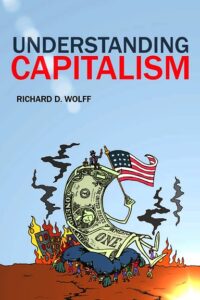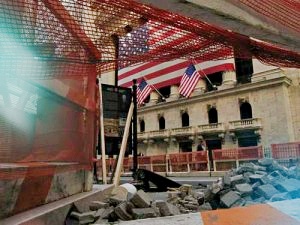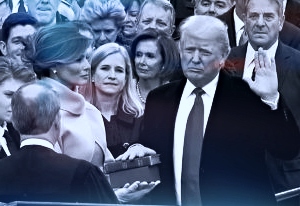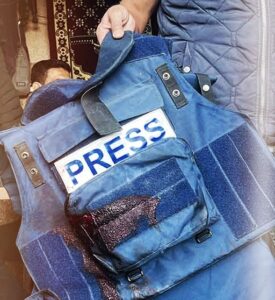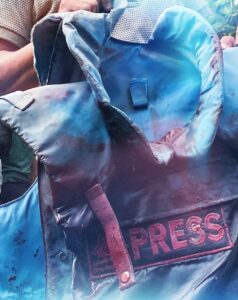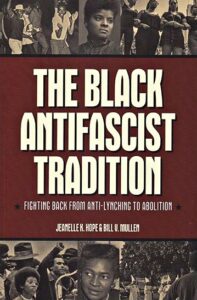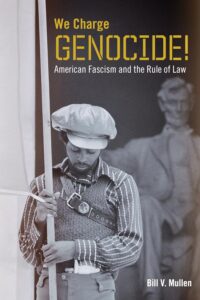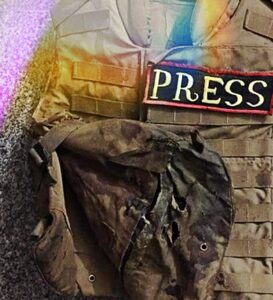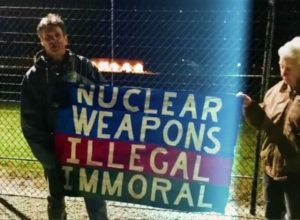Welcome to Law and Disorder Radio
Law and Disorder is a weekly independent civil liberties radio program airing on more than 150 stations and on Apple podcast. Law and Disorder provides timely legal perspectives on issues concerning civil liberties, privacy, right to dissent and practices of torture exercised by the US government and private corporations.
Law and Disorder November 4, 2024
Podcast: Play in new window | Download
Understanding Capitalism
The great German playwright, and political figure, Berthold Brecht, observed that to understand fascism you have to understand capitalism, from whence it springs. Today, it is also helpful for us to understand that the rise of fascism in Germany 100 years ago, has parallels we can see now with the rise of fascism in the United States.
Prior to World War I, which began in 1914, the German working class and middle class were relatively prosperous. The German unions were strong and influential. Prior to World War I, Germany also had the largest and strongest socialist party in the world, and it was the second largest political party in the German Parliament. The German economy was booming. And German culture was the jewel of Europe.
This all came to a crashing end in 1917, when Germany was defeated in what was an inter-imperial war against the United States, France, Great Britain and Russia. The consequences of that defeat brought us fascism and World War II, 20 years later. In the 1920’s, inflation wiped out the savings of the German people. When the depression hit in 1929, the German working class was desperate. The ground was fertile for the rise of Adolf Hitler, a ruthless, cunning and violent demagogue.
Here in the United States, our economy boomed for 100 years, from the end of the Civil War until the 1970s. But since then, American workers have not made any progress. Their wages, in real terms, have not risen in 50 years! “Neo- liberalism”, which is just another word for aggressive capitalism, has wiped out 30 million industrial jobs in the US, starting in the 1980s. Women were driven back into the workforce. People had to work two jobs just to keep up.
In Germany, it was the Jews who were blamed. Here in the US, it is immigrants and people of color who are scapegoated. The demagogue Trump, like Hitler before him, is a captivating speaker and a very effective cult leader, who is now poised to take the power of the government and turn it against “we the people.”
Guest – Richard Wolff is Professor Emeritus from the University of Massachusetts, and the author of the forthcoming book, “Understanding Capitalism”. According to New York Times, Richard Wolff is, probably America’s most prominent Marxist economist. He is the founder of Democracy at Work and host of their national syndicated show Economic Update. Professor Wolff has authorized numerous books on capitalism and socialism, including most recently “The Sickness is the System: When Capitalism Fails to Save Us From Pandemics or Itself“, “Understanding Socialism“; and “Understanding Marxism”, which can be found at democracyatwork.info.
—–
Present Danger Of Fascism In The United States
The rise of Donald Trump and his MAGA supporters has transformed American politics, perhaps more than anything else has since the gathering of forces of the rebellious slave owners in the south, a century and a half ago. His first four years in office were chaotic, uninformed programmatically, and not animated by any kind of cadre of capable administrators. It was, instead, full of his statements and actions that many critics deemed to be racist, sexist and Xenophobic.
He lost the election in 2020, although he received 74 million votes! As he runs for the Presidency again, this time he is talking rather openly about wanting dictatorial authority, if he is elected again.
And this time if he does win, he now has the aid of the right-wing Heritage Foundation, which has produced the 900-page “Project for 2025” document on how to radically change our country so as to make it far, far more conservative, providing far fewer rights to the American people, and allowing any president so inclined, to run the country as an authoritarian, a virtual dictator. He has an authoritarian right wing Supreme Court, which in its latest decision, aptly named “Donald Trump versus the United States of America,” has given the presidency carte blanche immunity, placing the president above the law, allowing the president to do almost anything he or she wants to do, as long as it’s deemed to be “an official presidential act”.
Today’s program is the lead off to a series of shows on fascism, how to resist it, and how to defend against it. I will be conducting this series with my co-host, Michael Smith, who cannot be with us today due to illness.
Guest – Chris Hedges, the journalist and author spent two decades as a foreign correspondent serving as the Middle East Bureau Chief and Balkan Bureau Chief for The New York Times where he was awarded the Pulitzer Prize. He is the author of 14 books including War is a Force That Gives us Meaning, Days of Destruction, Days of Revolt, which he co-wrote with the cartoonist Joe Sacco, and The Death of the Liberal Class.
—————————————-
Law and Disorder October 28, 2024
Podcast: Play in new window | Download
Special Report: Global Threats To Freedom Of Expression Arising From Gaza Conflict
On top of the devastating humanitarian crisis and the issues of genocide and violations of human rights in Gaza and the West Bank, there has been an unprecedented attack on freedom of the press and freedom of expression globally prompted by that war.
In August, Irene Khan the UN Special Rapporteur on the promotion and protection of the right to freedom of opinion and expression issued an alarming report examining the impact of the conflict in Gaza on freedom of expression throughout the world. The report highlighted “attacks on journalists and media restrictions, endangering access to information about the conflict globally; suppression of protests and dissent and undermining of academic and artistic freedoms in polarized political environment; and restrictions on legitimate political expression in the name of fighting terrorism and antisemitism.”
The Special Rapporteur assessed the compliance of States, social media companies and other private actors with international human rights standards, online and offline, and she found “an extensive pattern of unlawful, discriminatory and disproportionate restrictions on advocacy for the rights of Palestinian people.”
The report emphasized “the importance of freedom of opinion and expression – enjoyed on an equal basis by all sides – as an invaluable tool for fighting hate and encouraging mutual respect and dialogue.” Based on her detailed findings, the Special Rapporteur called on States, social media companies and other private actors to reject double standards on human rights and made concrete recommendations for them to uphold the right to freedom of opinion and expression equally for all.
Guest – Irene Khan, the UN Special Rapporteur on the promotion and protection of the right to freedom of opinion and expression. Appointed on August 1, 2020, Ms Khan is the first woman to hold this position since the establishment of the mandate in 1993. UN Special Rapporteurs are independent human rights experts with a mandate to report and advise on human rights from a thematic perspective. As part of her role, Ms Khan conducts country visits, acts on individual cases and sends official communications to governments, and presents thematic reports to the UN General Assembly.
—-
A History Of Anti-Black Racism
National chauvinism and racism are essential features of fascism. The practice of white racism in the United States during the Jim Crow era was something that Hitler’s party in Germany studied and emulated. This kind of anti-black racism went on in the United States from shortly after the Civil War up until the 1960s. It has never really gone away as the mass mobilizations of the Black Lives Matter movement has recently demonstrated. This Black resistance, this fight back, will be a central aspect of anti-fascist activity in the future.
Guest – Bill Mullen is professor emeritus of American studies at Purdue University and the co-founder of The Campus Anti-fascist Network. He’s also co-author of The Black Antifascist Tradition and his new book published last month We Charge Genocide: American Ashes and the Rule of Law.
—————————————
Law and Disorder October 21, 2024
Podcast: Play in new window | Download
Journalists Under Fire In Israel-Gaza Conflict
Today we turn to the status of press freedom in Israel. Since the Hamas attack on October 7, 2023, and during the ensuing war in Gaza ever since, which is now moving into the West Bank, the pressure on journalists who are trying to cover what’s been happening there is increasing… and more dangerous.
According to the New York-based Committee To Protect Journalists, the Israel-Gaza war has claimed the lives of more journalists over the course of a year than in any other conflict the organization has documented. They estimate 128 journalists killed and 69 imprisoned.
The foreign and Israeli journalists who are bold enough to enter Gaza to report on what’s happening can only do so if they are accompanied by Israeli forces… and under strict surveillance. And the Israeli military has no qualms about shutting down news outlets like Al Jazeera – even its bureau in Ramallah, in the West Bank, which is an area supposedly under Palestinian control.
And just last week, Israeli Occupational Forces arrested a US citizen, journalist Jeremy Loffredo, charging him with endangering national security for his reporting on Iranian strikes. Reporters Without Borders condemns what it calls Israel’s climate of intimidation, and has called on the Israeli authorities to stop obstructing the work of journalists covering the war.
Guest – Kevin Gosztola is a journalist and editor of The Dissenter Newsletter, which regularly covers whistleblowing, press freedom, and government secrecy. He is the author of Guilty of Journalism: The Political Case Against Julian Assange and known for his work reporting on the extradition proceedings against Assange and the court-martial against Chelsea Manning. Both were prosecuted and convicted under the Espionage Act.
—-
One issue from the Cold War topic stills looms large today: the growing threat of nuclear war. While many hoped the end of the Cold War would signal a retreat from the nuclear arms race, recent developments suggest otherwise. Tensions between amid U.S., Russia, and China have escalated, and key nuclear arms control treaties, such as the INF Treaty have eroded, with the future of the New START agreement uncertain.
The war in Ukraine, punctuated by Russia’s nuclear saber-rattling, has revived fears of potential nuclear escalation. At the same time, huge sums are being funneled into expanding and modernizing nuclear arsenals. In several decades, it is estimated that the total cost of modernizing and maintaining the U.S. nuclear arsenal amounts to approximately $1.7 trillion. Emerging technologies, like hypersonic missiles and Artificial Intelligence in military decision-making, further complicate the stability of nuclear deterrence, raising new questions about global security.
Guest – Dr. Ira Helfand is a member of the International Steering Group of the International Campaign to Abolish Nuclear Weapons, or ICAN, which was awarded the 2017 Nobel Peace Prize. Dr. Helfand is also the immediate past president of the International Physicians for the Prevention of Nuclear War, or IPPNW, a founding partner of ICAN and itself the recipient of the 1985 Nobel Peace Prize. He co-founded and served as past president of Physicians for Social Responsibility, the US affiliate of IPPNW. Dr. Helfand is also co-founder of the Back from the Brink campaign, the key vehicle for people in the U.S. who want to get involved in this issue.
—————————
